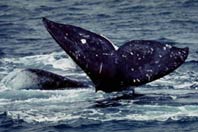|
Some folks in the US have taken up the habit of not being able to utter the word "environmentalist" without putting the word "extreme" in front of it. So, what exactly is extreme environmentalism? Maybe they mean someone who practices some weird outdoor X-sport like body surfing down the soft branches of a tall white pine? (And no, the branches aren't so soft, and yes, it hurts.)
 Are the critics right when they talk about environmental extremism? It may come as a surprise to find out that just about everyone in the mainstream environmental community also recognizes the existence of environmental extremists. Their definition of the term might include people who:
Are the critics right when they talk about environmental extremism? It may come as a surprise to find out that just about everyone in the mainstream environmental community also recognizes the existence of environmental extremists. Their definition of the term might include people who:
- spike trees, endangering loggers;
- sabotage and sink whaling ships;
- burn down new luxury housing developments or set big SUVs ablaze.
Whether mainstream environmentalists harbor any sympathy for the underlying goals of these acts, they decry the methods. Violence and illegal property destruction are not a means to an end, and such methods tend to tar law-abiding moderate environmentalists with the same brush.
The next level down in the "extremism" hierarchy might be said to include those who gather in peaceful protest, tree sit, engage in non-violent civil disobedience, or harass whaling ships. This is a grayer category. Some would call one or more of these acts extremist, but others would not, saying that the acts are necessary to draw attention to situations that are otherwise being ignored.
 But the real problem with how the term "environmental extremist" is used these days is that it is often applied to EVERYONE in the environmental movement. Suddenly, those who petition for EPA enforcement of existing environmental laws, those who pressure governments to increase the effectiveness of pollution-reducing measures, and those who object to backroom deals between industry and our elected officials—suddenly, all of these people are "environmental extremists." If anyone stands in the way of the pro-industry agenda or challenges the system to do a better job of protecting people and the environment, they're labeled an extremist.
But the real problem with how the term "environmental extremist" is used these days is that it is often applied to EVERYONE in the environmental movement. Suddenly, those who petition for EPA enforcement of existing environmental laws, those who pressure governments to increase the effectiveness of pollution-reducing measures, and those who object to backroom deals between industry and our elected officials—suddenly, all of these people are "environmental extremists." If anyone stands in the way of the pro-industry agenda or challenges the system to do a better job of protecting people and the environment, they're labeled an extremist.
There are indeed some people who love the earth so much that they have lost perspective on the best way to effect change. They may try to justify their illegal or immoral acts as tit-for-tat responses to illegal or immoral situations. But that doesn't hold water with most environmentalists. Labeling these people "environmental extremists" is fair. But the majority of environmentalists are not extremists. Those who would call them extremists are themselves the extremists, resorting to name-calling to undermine those who would dare to disrupt their political and corporate agendas.
Well, speaking of agendas, the boss just called a meeting, which is fine—we can use a good nap.
Resources:
|


